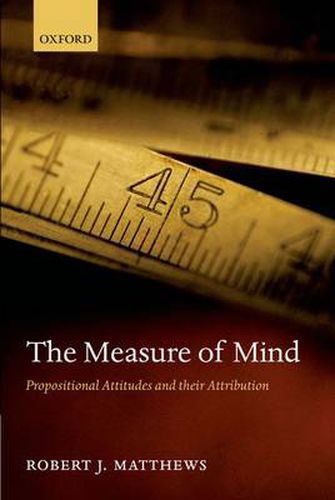Readings Newsletter
Become a Readings Member to make your shopping experience even easier.
Sign in or sign up for free!
You’re not far away from qualifying for FREE standard shipping within Australia
You’ve qualified for FREE standard shipping within Australia
The cart is loading…






The Measure of Mind provides a sustained critique of a widely held representationalist view of propositional attitudes and their role in the production of thought and behaviour. On this view, having a propositional attitude is a matter of having an explicit representation that plays a particular causal/computational role in the production of thought and behaviour. Robert J. Matthews argues that this view does not enjoy the theoretical or the empirical support that proponents claim for it; moreover, it misconstrues the role of propositional attitude attributions in cognitive scientific theorizing. He then goes on to develop an alternative measurement-theoretic account of propositional attitudes and the sentences by which we attribute them. On this account, the sentences by which we attribute propositional attitudes function semantically like the sentences by which we attribute a quantity of some physical magnitude (e.g., having a mass of 80 kilos). That is, in much the same way that we specify a quantity of some physical magnitude by means of its numerical representative on a measurement scale, we specify propositional attitudes by means of their representatives in a linguistically-defined measurement space.
Matthews argues that, unlike the representationalist view, his account of propositional attitudes draws a clear distinction between propositional attitudes and our natural language representations of them, and does not presume that salient properties of the latter can simply be read back onto the former. On his view, propositional attitudes turn out to be causally efficacious aptitudes for thought and behaviour, and not mental entities of some sort. In defending this approach, Matthews provides a plausible account both of the standard philosophical puzzles about propositional attitudes, and of the role of propositional attitude attributions in cognitive scientific theorizing.
$9.00 standard shipping within Australia
FREE standard shipping within Australia for orders over $100.00
Express & International shipping calculated at checkout
The Measure of Mind provides a sustained critique of a widely held representationalist view of propositional attitudes and their role in the production of thought and behaviour. On this view, having a propositional attitude is a matter of having an explicit representation that plays a particular causal/computational role in the production of thought and behaviour. Robert J. Matthews argues that this view does not enjoy the theoretical or the empirical support that proponents claim for it; moreover, it misconstrues the role of propositional attitude attributions in cognitive scientific theorizing. He then goes on to develop an alternative measurement-theoretic account of propositional attitudes and the sentences by which we attribute them. On this account, the sentences by which we attribute propositional attitudes function semantically like the sentences by which we attribute a quantity of some physical magnitude (e.g., having a mass of 80 kilos). That is, in much the same way that we specify a quantity of some physical magnitude by means of its numerical representative on a measurement scale, we specify propositional attitudes by means of their representatives in a linguistically-defined measurement space.
Matthews argues that, unlike the representationalist view, his account of propositional attitudes draws a clear distinction between propositional attitudes and our natural language representations of them, and does not presume that salient properties of the latter can simply be read back onto the former. On his view, propositional attitudes turn out to be causally efficacious aptitudes for thought and behaviour, and not mental entities of some sort. In defending this approach, Matthews provides a plausible account both of the standard philosophical puzzles about propositional attitudes, and of the role of propositional attitude attributions in cognitive scientific theorizing.